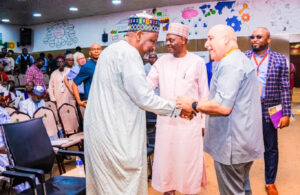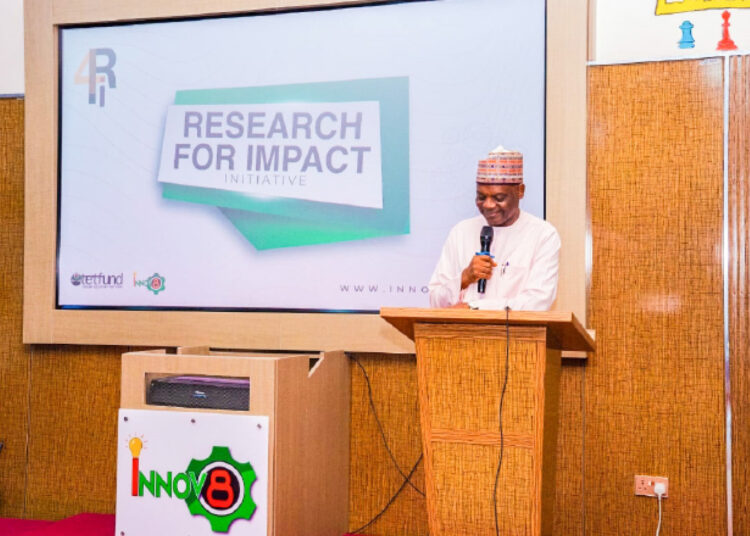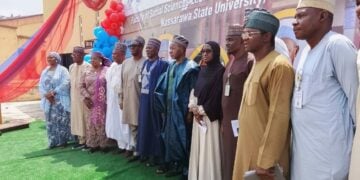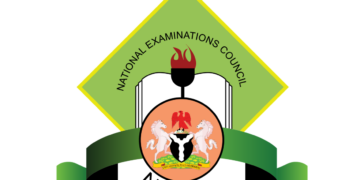The Tertiary Education Trust Fund (TETFund) has had a profound and transformative effect on Nigeria’s research and innovation through its Research for Impact (R4i) Programme.
The R4i initiative, designed to bridge the gap between academic research and real-world solutions is fostering collaboration among researchers.
The programme has so far led to the development of over 152 prototypes across various fields, contributing significantly to both academic and societal advancement.
A total of 707 researchers have participated in this initiative, which not only supports the creation of prototypes but also emphasises the importance of commercialising innovative ideas, ultimately empowering Nigerian researchers to make substantial contributions to national development and address global challenges.
One of the most notable aspects of the R4i Programme is its ability to bring together a diverse range of intellectuals, researchers, and innovators from various disciplines to work toward practical solutions.
Through their collaborative efforts, these researchers have developed prototypes in sectors such as agriculture, healthcare, engineering, and technology, addressing some of the most pressing issues facing the country and the world today.
By shifting the focus of academic research from theoretical frameworks to problem-solving and application-based outcomes, the R4i Programme has redefined what it means to conduct meaningful research in Nigeria.
At the recent closing ceremony of the 30th Cohort of the Research for Impact (R4i) initiative, held at Innov8 Technology Hub in Abuja, some participants shared their inspiring experiences and reflections on their journey through the programme.
Engr. Victoria Ada Abodenyi, a researcher from Federal Polytechnic Bauchi, expressed her deep appreciation for TETFund, Innov8 Hub, and Federal Polytechnic Bauchi for providing such a transformative experience.
She emphasised that one of the major challenges in Nigerian research is the difficulty in translating acquired knowledge into practical, action-based solutions.
According to Engr. Abodenyi, there is a significant gap between theoretical knowledge gained in academic institutions and the ability to translate that knowledge into tangible solutions that have an impact on society.
“Knowledge is power, but only if you know how to utilize it. What if I told you that more than half the knowledge acquired from our tertiary institutions has not transcended into power? Would you agree?”
Engr. Abodenyi also shared that her years as a researcher in the classroom, laboratory, and workshop had produced limited action in terms of impactful change.
She recalled how her findings had often been relegated to academic publications with no real-world application. However, her experience at R4i sparked a paradigm shift.
“I refused to weep because the realization that now is time enough for impactful change in innovative research has been ignited by the experience I got at R4i,” she said.
Through the R4i initiative, she found the knowledge and tools necessary to transform her research into viable solutions that could make a meaningful difference in society.
Abodenyi went on to state the high caliber of facilitators and experts she encountered throughout the programme.
The sessions were delivered by seasoned professionals with cutting-edge knowledge, and they provided practical, problem-solving techniques that enabled her to apply her research in innovative ways.
“Each facet had something new to deliver; it was a whole time of learning, unlearning, and relearning for me,” she noted.
The team of young, talented experts and the advanced laboratories and workshops were invaluable resources, churning out prototypes that showed the immense potential of collaborative research.
Through the R4i programme, Abodenyi realized that research should be problem-based, aimed at finding impactful solutions that add value to society and lead to commercialization.
Similarly, Fakunle Abayomi, a participant from The Polytechnic Ibadan, shared his thoughts on the R4i initiative. As a tech enthusiast, Abayomi was excited to be nominated for the programme.
Reflecting on his journey in mechatronics, he realised that much of his previous work had focused on “proof-of-concept” projects, which were primarily aimed at creating prototypes to demonstrate that they worked. While these projects were valuable in proving the feasibility of concepts, they often lacked real-world application.
The R4i Programme, however, promised a shift in focus toward developing impactful solutions that addressed societal problems.
Abayomi recalled his first experience at Innov8 Hub, where he was overwhelmed by the creativity and innovation that filled the space. “It felt like stepping into a fever dream,” he said.
The atmosphere was one of excitement, excellence, and collaboration. He was impressed by the high concentration of talent and the professionalism of the engineers, facilitators, and support staff who welcomed participants with enthusiasm.
“Excellence seemed to radiate from every corner,” he observed. This environment of creativity and collaboration provided Abayomi with the perfect setting to explore and develop his ideas further.
Throughout the course, Abayomi experienced a significant shift in his understanding of research. He learned the importance of conducting demand-based research, which not only benefits the researcher but also addresses critical societal issues.
The programme emphasized the need for researchers to identify real-world problems and create solutions that can have a lasting impact.
“The thoughtfully designed journey from ideas to concepts, prototypes, and eventually creating a thriving business around it, awakened the problem-solver in me,” Abayomi said.
One of the highlights of his experience was participating in the innovation and engineering process while developing a prototype for an exercise device.
He was struck by the power of collaboration and team-based problem-solving. Abayomi recognized that working with a diverse group of experts with different skills and perspectives led to more innovative and practical solutions.
The hands-on experience he gained in the process was invaluable, and he expressed a strong desire to replicate the knowledge and processes he had learned when he returned to his institution.
Abayomi concluded by expressing his gratitude to TETFund and Innov8 Hub for enabling the R4i initiative, as well as to the facilitators and engineers who guided participants throughout the programme.
He also thanked Dr. T. A. Lasisi, the Rector of the Polytechnic Ibadan, for his support in championing their role as institutional ambassadors for the 30th cohort of R4i.

In conclusion, the TETFund Research for Impact (R4i) Programme has been a groundbreaking initiative that has significantly impacted the research landscape in Nigeria.
By focusing on the commercialisation of innovative research and fostering collaboration among researchers from various disciplines, the programme has helped bridge the gap between theoretical knowledge and practical solutions.
As seen through the experiences of Engr. Victoria Ada Abodenyi and Fakunle Abayomi, the R4i initiative has empowered Nigerian researchers to create prototypes that address pressing societal challenges and contribute to both national and global development.
With over 152 prototypes developed so far, the R4i Programme continues to inspire and enable researchers to turn their ideas into reality, making a tangible impact on Nigeria’s development and the world at large.





